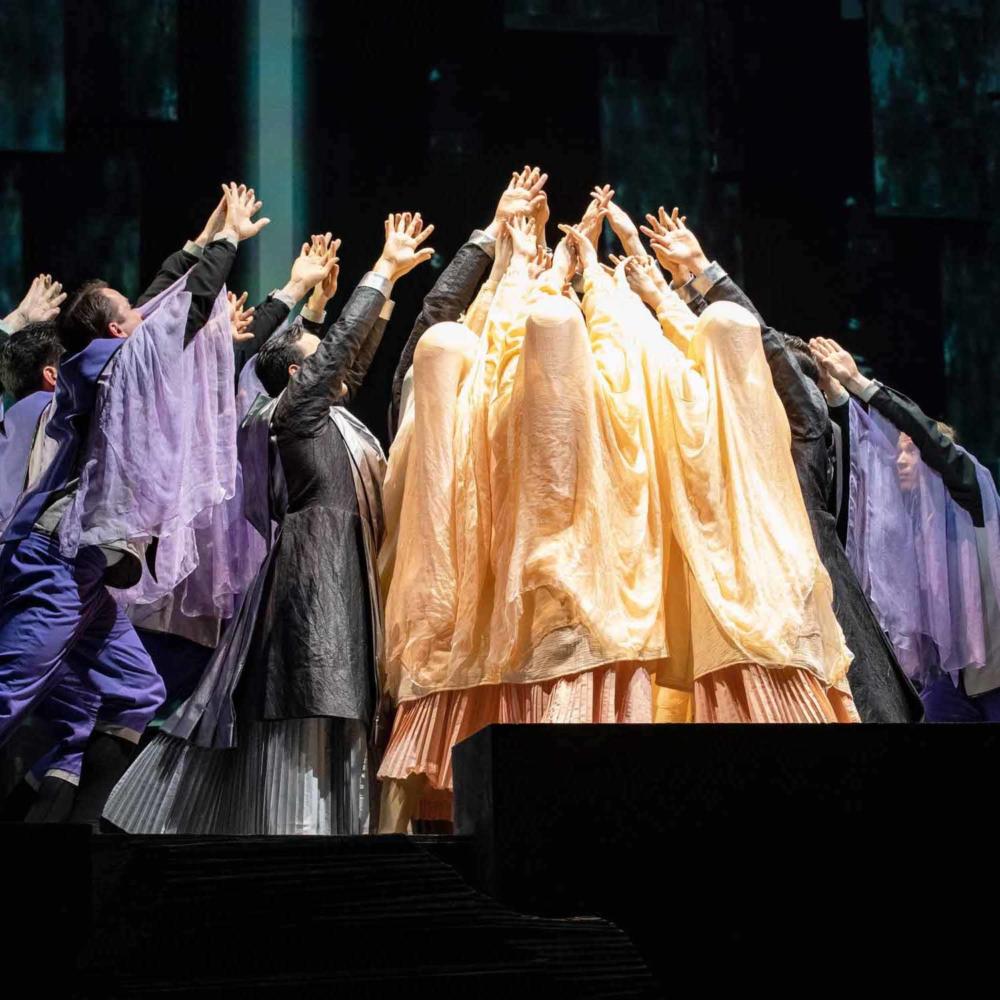‘A piece of cultural history – live’
In the production of Richard Wagner's Parsifal by Jasmin Solfaghari (opera director) and Stefan Hasler (eurythmy director) at the Goetheanum, the different arts support each other and form a whole. Public critics were amazed at the powerful effect of presenting Grail, spear and swan in eurythmy rather than as objects
The production of Richard Wagner's Parsifal at the Goetheanum allows the audience to experience the potential for development in opera. One hundred and forty years after its premiere in Bayreuth (DE) in 1882, this opus that has seen many a production comes to life by facing new challenges. Eurythmy, as well, which has existed in its own right and in drama for over 100 years, receives a new impetus when it meets opera (this was not the first such meeting, however). This mutual stimulation is made possible by Jasmin Solfaghari who, together with Walter Schütze (stage and costume design), takes up the movement language of eurythmy in the choir and stage design. Together with the eurythmists, Stefan Hasler succeeds in making eurythmy a natural part of the opera’s storyline. It begins in the overture, where the intrinsic musical motifs (Felix Lindenmaier) ensure right from the start that the eurythmy is visible. When there’s development in the action or it comes to a standstill, singers and eurythmists form a unity: they shape the events together, each out of its own sphere.
Wish for stagnation and redemption
The conditions the protagonists find themselves in are most unfavourable: the suffering of Anfortas, the Grail King who has become guilty, demands stagnation; Titurel’s and the Grail community’s loss of strength requires the revelation of the Grail. With Klingsor, Kundry and Parzifal, too, it becomes apparent how they have failed and how each of them deals with this failure. Richard Wagner ensures that all these soul moods and their interrelations find nuanced tonal expression. The professional opera choir (Vokalwerk der Opernfestspiele Heidenheim) conducted by Andreas Klippert, and the Baden-Baden Philharmonic Orchestra, conducted by Roland Fister, sing and play delicately, never intrusively, giving space to the intrinsic values of the sounds.
The stage set reflects the heaviness of the soul moods all the more strikingly, creating sub-spaces by introducing different tiers and levels; projections are used to generate width of soul and the transformations show that change is still possible.
Here, the eurythmy is sometimes given little room. The female/male dichotomy is conspicuous because it is both consistent and goes against the zeitgeist.
The second act feels liberating because a lot is going on in Klingsor’s castle: many people, plenty of movement, pyrotechnics, good timing - until Kundry and Parsifal meet who have much to say to each other. Here, expressionist gestures are used to bridge the pause in external activity. Kundry singer Ivonne Fuchs, who really brings the impetuousness of her role to life with flexible, supple, dramatic playfulness, is accompanied by three eurythmists who express different facets of her soul life.
There is humour, too: in small actions or in the eurythmy, when the walking becomes excessively formal, for instance. Only once, in the redemptive unfolding of the Grail, I would have wished that the space on stage had also expanded. But even then, the presentation of the Grail breathes floral magic and gives in to the delicate music.
Horizon-broadening
Despite simplifications such as ‘Parsifal for anthroposophists’, the critics acknowledge the special approach of using eurythmy instead of the traditional representation of swan, spear and grail. In the night of the premiere, Jörn Florian Fuchs of the German radio station Deutschlandfunk sets the tone (3 April 2023): ‘There is […] no interpretation. There is no message either, no proselytizing. The play is being taken seriously. […] There are no symbols. The grail is absent […] all that is outsourced to the eurythmy, as it were, one can simply absorb this as an aesthetic pleasure in this case. […] The [musicians of the Baden-Baden Philharmonic] do this extremely well. […] It is horizon-broadening, not only for Wagnerians, but also because the eurythmy and Steiner’s theatre aesthetics as a whole are also a cultural phenomenon, beyond anything religious, and we consequently experience a piece of cultural history - live.’
On 4 April 2023, on another German radio station, MDR Klassik, Bernhard Doppler speaks of being impressed by ‘the professional musical achievement. […] Roland Fister directs the Philharmonic Orchestra effectively and the singers master their challenging parts effortlessly […]’ And: ‘[...] in its earnestness certainly an interesting alternative to traditional opera’.
Fabian Kristmann writes in the Swiss newspaper Basler Zeitung› on 4 April 2023: 'What was far more meaningful and original – and the real highlight of this Parsifal – was the literal embodiment of the central symbols [...] by eurythmists.’ With regard to the Grail chalice the writer thought that ‘As a result, this production gains additional content that can be directly experienced.’ His conclusion: ‘The Goetheanum made an interesting contribution to Wagner's presence [in the Basel region].’ Christian Wildhagen speaks of ‘memorable performance’ in the Neue Zürcher Zeitung of 6 April 2023: ‘The objects that are charged with meaning are only represented symbolically by the eurythmists - a clever move that refers to Steiner’s postulate that there is an immaterial world behind everything material. Roland H. Dippel writes in Neue Musikzeitung on 8 April 2023 about ‘evident food for thought’ and states, ‘The emancipation of women in the questionable Parsifal cosmos constitutes undeniable progress in the Wagner exegesis, with women flapping their wings and synchronously acting men in the eurythmy ensembles.’
The successful cooperation between Pamy Mediaproductions and the Goetheanum was also worthwhile for the audience, as was evident from the applause and feedback.
Parsifal at the Goetheanum
24, 29, 31 March 2024, 4 pm, Goetheanum.
Tickets available from 1 June 2023

